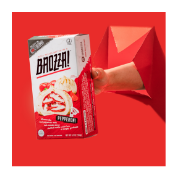FAQ
Product
What is a bao?
A bao (pronounced like bow wow) or bāozi (包/包子) is a steamed bun, typically stuffed with meat or vegetable fillings, originating in China centuries ago, and now eaten all across Asia and increasingly the rest of the world. Because it's steamed rather than baked, the dough has a white color and a soft, spongey texture, unlike baked leavened breads or pizza crusts. A typical bao is hand-wrapped and features radiating pleats on the top, though they come in many shapes and styles. Across Asia, bao is typically eaten for breakfast, as snacks, or as part of meals. A typical bao fits in the palm of your hand and is most often a grab-n-go option sold as street food or in convenience stores.
Where are they made?
Baozza is produced in state-of-the-art, minority-owned production facilities in United States.
Where are they sold?
We’re available at select grocery stores nationwide, including Sprouts, Harris Teeter, Big Y, Price Chopper, Coborn's, Plaid Pantry, and many local indepentent grocers.
Are they gluten free?
No. Traditional Chinese bao is wheat-flour based and contains gluten. We use the highest quality wheat flour to keep our bao dough as delicious and authentic as possible, with a little herb infusion twist to give it that pizza taste.
Do you plan to launch a plant-based Baozza?
We've been doing plenty of plant-based Baozza R&D for several years and it's something we're very interested in doing at some point. We’ll keep you posted if we do launch a vegan Baozza.
Do they contain any raw or uncooked ingredients?
Nope! Each Baozza is fully cooked already. All you need to do is heat and eat.
What type of allergens are found in Baozza?
Each Baozza contains milk and wheat. They are produced in a facility that also processes cashew nuts.
How should they be stored?
We recommend keeping your Baozza frozen at 0ºF or lower.
Are the steamer bags microwave safe?
Yep. They are in 100% compliance with US FDA requirements for plastics that come into contact with foods. Our steamer bags contain no microplastics.
Are the steamer bags environmentally friendly?
Our patented BPA-free steamer bags use 33% less plastic than traditional poly bags. They are two-ply and not recyclable, unfortunately. We're exploring more environmentally sustainable materials – if you have any suggestions or resources in this area, please contact us: hello@baozza.com.
Brand
Who are the founders?
Baozza was founded in 2016 by long-time friends Alex Cree & Loren Heinold, two Americans living and working in Beijing, China.
So, Is Baozza based in China or the US?
Both! We got our start in China, but today we’re a multi-national company. Our U.S. headquarters is in Los Angeles, and our China headquarters is in Beijing.
Didn’t you guys used to run Baozza restaurants in China?
Yep! We started with a delivery ghost kitchen in Beijing in 2016, then moved to our own sit-down place in the hutongs in 2017. Then we opened a flagship kiosk in Shanghai in 2019. During that time, we also did satellite ghost kitchen delivery in a half dozen other places around Shanghai, covering most of the city. Covid hit China in early 2020, which shut our stores and satellite delivery down, but with frozen sales having taken off, we decided to focus solely on that, which allowed us to reach a much larger audience. And we haven’t looked back.Today we’re operating at scale in China and are growing!
Do you guys make traditional Asian bao?
No. Baozza is unadulterated fusion – delicious gooey pizza fusion. We are not the standard bearer for classic Chinese or Asian versions of steamed bao buns. We *love* bao, but we want to be clear that we are a bao fusion brand, and not trying to attempt traditional flavors.
Is this cultural appropriation?
We’re not in a position make that judgement. What we will say is a few things:
We’re not the first to make pizza bao. Japanese convenience stores have been selling pizza bao (pizza-man) for decades, and we’re not even the first to do it in China or the first to do it in the US.There are Asia-based food manufacturers that have been selling before us in each of these markets.
Our entire product line was originally developed in China for the Chinese market, where it’s been sold and is still growing today. We’ve never faced any serious cultural backlashes, though we do have a lot of fans.
We are an American brand with a very American product. We do our best not to utilize Chinese or Asian cultural elements as part of our brand and social media presence. Naturally, we were founded in China and learned how to produce bao from local Chinese, so that is a large part of our history, but we’re trying to create a unique brand of our own that is not culture-driven. We would emphasize: We are NOT the standard bearer for traditional Chinese/Asian bao.
What’s the best contact for collabs and partnerships?
Please contact us at: partnerships@baozza.com.





